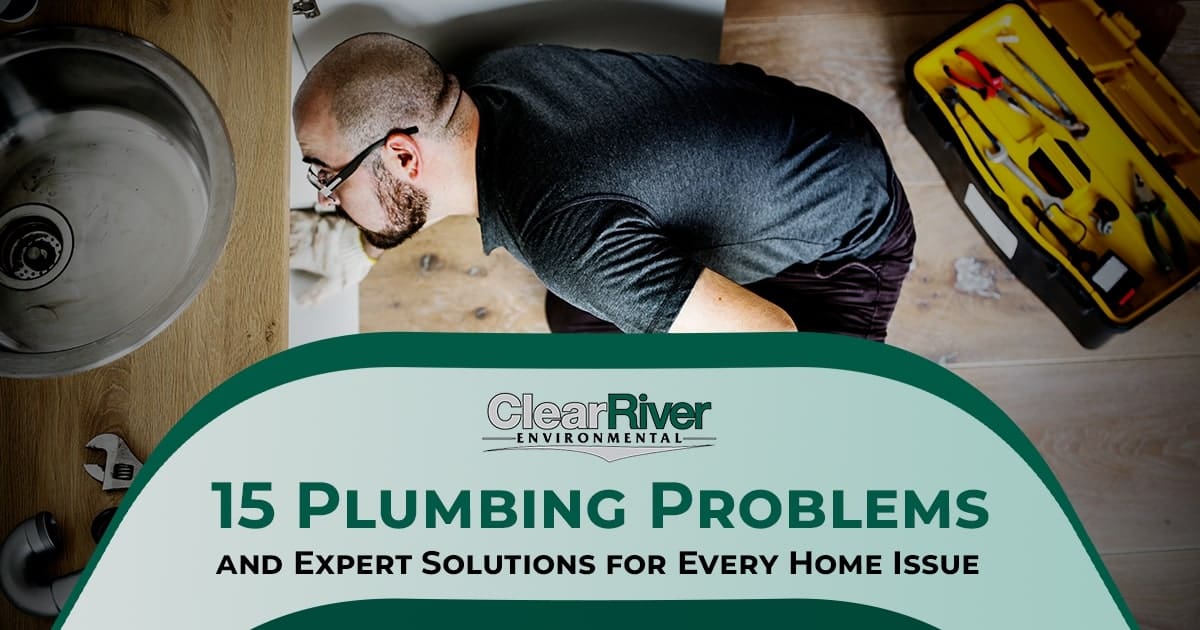15 Plumbing Problems and Expert Solutions for Every Home Issue
- David Warren
- November 1, 2025

Every homeowner faces a plumbing issue at some point. Whether it’s a dripping faucet, clogged drain, or burst pipe, these problems can quickly disrupt your day. Plumbing problems in house structures often start small but can escalate into costly repairs if ignored. At Clear River Environmental, we’ve seen every kind of plumbing failure and know exactly how to fix them with professional precision.
Our expert plumbers combine years of experience with modern tools to ensure every plumbing problem scenario is solved efficiently and safely.
In This Article
1. Leaky Faucets - The Silent Water Waster
A leaky faucet might seem minor, but it’s one of the most common plumbing issues in house maintenance. The constant drip not only wastes gallons of water daily but also increases your utility bills. The usual cause is a worn-out washer or valve seat.
Solution: Our technicians replace these components, reseal the joints, and restore smooth water flow without the annoying drip.
2. Clogged Drains - A Hidden Plumbing Problem
Clogged drains can quickly turn into one of the worst plumbing problems. Soap scum, grease, hair, and debris accumulate over time, leading to slow drainage or complete blockage.
Solution: Our professional plumbing troubleshooting approach includes camera inspections and hydro jetting to clear the buildup without damaging your pipes.
3. Running Toilets - The Constant Plumbing Fault
If your toilet runs long after flushing, it’s a sign of a plumbing fault. The culprit is often a damaged flapper valve or misaligned float.
Solution: Our team diagnoses the issue quickly and installs durable parts that prevent water waste and noise.
4. Low Water Pressure - A Frustrating Plumbing Issue
Low water pressure can make showers and cleaning inefficient. Mineral buildup in pipes or hidden leaks may be the root cause.
Solution: Our experts perform detailed inspections, clean aerators, and repair leaks to restore steady water pressure.
5. Leaking Pipes - The Classic Plumbing Failure
Pipe leaks are a homeowner’s nightmare. They can lead to mold growth, water damage, and structural deterioration.
Solution: We use advanced detection technology to locate leaks and repair them before they become major plumbing failures.
6. Water Heater Malfunctions - A Comfort-Disturbing Problem
A malfunctioning water heater is a major plumbing issue, especially in colder months. If you notice inconsistent water temperature or discolored water, it’s time for professional attention.
Solution: We offer complete water heater repair and replacement services to keep your system running efficiently.
7. Slow Draining Sink - A Sign of Bad Plumbing
When your sink drains more slowly than usual, it may be due to partial clogs or bad plumbing design.
Solution: Our experts dismantle the trap, remove the clog, and clean the pipes thoroughly to restore proper drainage.
8. Sewer Line Backup - The Worst Plumbing Problem
Sewer backups are among the most dreaded plumbing problems and solutions require urgent professional help. They often occur due to tree root intrusion, collapsed pipes, or grease buildup.
Solution: We use high-resolution cameras to diagnose the problem and employ trenchless repair methods to fix it quickly.
9. Burst Pipes - A Serious Plumbing Emergency
Frozen or aged pipes can burst unexpectedly, causing extensive damage. This is one of the worst plumbing problems a homeowner can face.
Solution: Our emergency response team acts fast to shut off water, repair the burst section, and prevent future failures with insulation and maintenance advice.
10. Dripping Showerheads - A Simple but Annoying Problem
Dripping showerheads waste water and increase your bills. The issue usually stems from a worn-out washer or mineral buildup.
Solution: We clean, replace, and reseal fittings to eliminate the drip for good.
11. Jammed Garbage Disposal - A Common Plumbing Issue
A jammed garbage disposal can stop your kitchen routine. Overloading or improper items like bones and grease cause jams.
Solution: We safely reset or replace your disposal unit to restore its operation and give tips on proper use to avoid repeat problems.
12. Toilet Clogs - A Frequent Plumbing Fault
Frequent toilet clogs are frustrating and can indicate deeper plumbing issues in house drainage systems. Using a plunger might offer temporary relief.
Solution: Our technicians provide long-term solutions by clearing the line thoroughly and inspecting for hidden blockages.
13. Faulty Sump Pump - A Risky Plumbing Failure
If your basement floods after heavy rain, your sump pump might be failing. Electrical faults or debris buildup can cause a malfunction.
Solution: We inspect the system, clean or replace the pump, and ensure it operates reliably during storms.
14. Noisy Pipes - A Sign of Bad Plumbing Design
When pipes make knocking or rattling sounds, it’s often due to water hammering. This bad plumbing design can be corrected by installing air chambers or securing loose pipes.
Solution: Our team ensures your plumbing system runs silently and efficiently.
15. Hidden Water Leaks - The Silent Plumbing Problem
Hidden leaks inside walls or ceilings can cause severe water damage. Early detection is crucial.
Solution: We use advanced leak detection technology to find and fix these problem plumbing areas before they escalate into a full-blown plumbing failure.
Why Choose Clear River Environmental
At Clear River Environmental, we take pride in offering expert plumbing solutions backed by years of trusted service. Our team of certified plumbers is dedicated to diagnosing and fixing every plumbing issue quickly, ensuring your home remains safe, efficient, and comfortable. We use state-of-the-art equipment and environmentally friendly methods that protect your property and the planet. From troubleshooting plumbing systems to repairing the worst plumbing problems, we handle it all with professionalism and care.
When you choose us, you’re not just hiring plumbers—you’re partnering with a company that values integrity, reliability, and customer satisfaction above all else.
Final Thoughts
Every home will face a plumbing issue sooner or later, but with the right professional help, no problem is too big to handle. From small leaks to major plumbing failures, Clear River Environmental offers reliable, lasting solutions for every situation in Long Island. Our expertise ensures your home stays dry, safe, and efficient throughout the year.
Contact us today at Clear River Environmental for professional plumbing services and peace of mind.
Frequently Asked Questions
The most common plumbing problems include leaky faucets, clogged drains, running toilets, and low water pressure.
Look for signs like slow drains, dripping fixtures, and sudden increases in water bills. These usually point to hidden plumbing faults.
Plumbing failure is often caused by aging pipes, poor installation, or neglecting regular maintenance.
Schedule routine inspections, avoid flushing foreign objects, and have professionals perform maintenance on your plumbing system.
Turn off the main water supply immediately and contact professional plumbers like Clear River Environmental for a quick response and repair.
Minor issues like clogged drains can be handled with a plunger, but for severe problems and solutions, always consult experts to prevent further damage.
Common plumbing issues include clogged drains, leaky faucets/pipes, low water pressure, running toilets, and water heater problems, often caused by hair, grease, corrosion, or old parts; more serious issues involve sewer line backups or frozen pipes, but many minor problems can be fixed with DIY methods like using plungers, drain cleaners, or replacing washers.
To find a plumbing leak, first check visible areas (under sinks, toilets, appliances) for dampness or stains, listen for running water, and check your water meter's continuous movement; then, isolate sections by turning off the main valve to pinpoint if the leak is inside or outside, and use tools like moisture meters or hire a pro for hidden leaks in walls or under floors, often indicated by soft drywall or lush yard spots.
Signs of failing polybutylene (PB) pipes include frequent leaks (especially at joints), sudden drops in water pressure, discolored or cloudy water, water stains/mold, and musty odors, often appearing without external warning as the material degrades internally from chlorine. Look for gray, dull-looking pipes stamped "PB2110," as internal breakdown (flaking, pinholes) causes sudden, severe leaks, often near fittings, requiring professional repiping.
Get in touch with Us

David Warren, Vice President and one of the founding visionaries of Clear River Environmental, brings
deep expertise in environmental stewardship, residential services, and operational leadership. Since cofounding the company, he has been instrumental in guiding Clear River’s evolution from a local cesspool service to Long Island’s leading provider of plumbing, septic, and environmental solutions, completing over 25,000 installations to date.
